- Home
- Gerald Hammond
The Executor (Keith Calder Book 10) Page 2
The Executor (Keith Calder Book 10) Read online
Page 2
‘Not until this morning. There had been a short item on the news but as far as I know Mr Winterton’s name hadn’t been mentioned.’
‘Just “an elderly man” and “a country house near Penicuik”?’
‘That sort of thing, yes, although I think they mentioned Leadburn rather than Penicuik. But I dare say that any intelligent and unscrupulous dealer could have visited the area. A few questions would soon have given him the address.’
Keith nodded. ‘Who was he?’ he asked the widow.
‘I haven’t the faintest idea,’ she said.
‘But his cheque—’
‘He paid me cash.’
Keith fought back an urge to throw himself down, scream and bite the carpet. His estimate of her IQ had erred on the flattering side. ‘Describe the man,’ he said.
‘He looked very ordinary. Tidily dressed in clean but cheap clothes. Polished shoes. He had a flat cap but he had removed it. His hair was black and very oily, but thinning, rather in need of a trim. I would say that he was in his forties. A short man but of burly build.’
‘And his face?’
‘Really, is this necessary?’
‘Of course it’s necessary,’ said Mr Enterkin. ‘Mr Calder is trying to extricate you from a serious predicament. Try to help him.’
‘In my business, I know most of the knockers,’ Keith explained.
‘The what?’
‘The antique business is in two main parts. Dealers, with their own premises, sell to the public. They buy from private clients, from auctions and from knockers. A knocker only has a store to work from. He also attends auctions, but spends most of his time “on the knock”, visiting houses in the hope of finding valuable antiques which he can often buy for far less than the real value and resell to whichever dealer gives the best price for that category of goods.’
‘Oh, very well.’ Mrs Winterton thought for a few seconds. ‘He had no beard or moustache. He was slightly in need of a shave. I don’t mean that he had omitted to shave that day,’ she explained. ‘If that had been the case I should never have let him into the house. But he had the kind of black hair which produces a blue chin within a few hours. He had a round face. And that’s all I can remember.’
‘Not the colour of his eyes?’
‘No.’
‘What can you remember about his van?’ Keith asked.
‘Just a grey van, neither very large nor very small.’
‘And his voice?’
‘Deep. One of those affected accents you hear such a lot of in these parts. A Scotsman trying to sound English.’
Keith nodded. The working and lower middle class Edinburgh accent can sound affected to the stranger who only mixes with the upper crust.
‘Do you know the man?’ Mr Enterkin asked anxiously.
‘I can think of several who might fit the description,’ Keith said. ‘Mrs Winterton, tell us everything that happened.’
‘The man asked me, very politely, whether I had any antiques which I might be prepared to sell. I said that I had no intention of parting with my treasures but that my husband had left a lot of old guns. I took him to look at them. He said he’d give me a hundred and fifty pounds and take them off my hands. I was only too happy to be rid of the things but I thought that I might as well see how far he would go. I said that I was sure that they were worth more than that. He said that today’s market was very uncertain but that he’d taken a fancy to me because I reminded him of his mother, so he’d go to two hundred pounds. The reference to his mother nearly made me change my mind,’ Mrs Winterton said loftily, ‘but I decided to accept his offer despite his attempt at familiarity.’
Keith switched back to the solicitor. ‘That was fraud, wasn’t it?’ he demanded.
The solicitor pouted again. ‘If those were the exact words, probably not. If he stated or implied that those guns were worth only the sum paid, there were no witnesses to the statement. But in any case, Keith, that’s not a good line to follow.’
‘Why not?’
‘Because, if they’ve already been resold—’
‘Which they probably have,’ Keith said. ‘Especially if this was a put-up job. I can well imagine one of the big dealers sending his pet knocker along to see if he can’t grab them both a thief’s bargain.’
‘—which, as you say, they probably have, the second purchaser could well have a valid title to them and all you could do would be to sue the – er – knocker for the shortfall. On the other hand, Mrs Winterton did not have the right to sell them in the first place. They were not hers to sell. Accordingly, the sale did not take place and thus any subsequent sale was equally invalid and could be upset.’
‘That sounds a little more hopeful,’ Keith said. ‘Not much, but a little. Now all we’ve got to do is to trace the dealer and every subsequent purchaser and prove to a court how little money changed hands in the first transaction and how much the guns are really worth.’
‘You’re over-simplifying,’ Mr Enterkin said, ‘but that will do to be getting on with.’
‘I’m so glad,’ Keith said. ‘Mrs Winterton, was there a name on the van?’
‘None that I noticed.’
‘There probably wouldn’t be,’ Keith said. ‘How did he pack the guns? Carefully, I hope.’
‘Very. He had a stack of old newspapers in the van and he wrapped them all individually.’
‘You watched him? Then you must have seen whether he already had some goods in the van.’
For some reason the question seemed to disconcert the widow. She took her time thinking. ‘I did watch him,’ she said at last. ‘After all, I wanted to be sure that he took nothing away but the guns. As far as I can remember, the van was empty except for the newspapers and a box he packed the long guns into.’
‘What sort of box?’ Keith asked quickly.
She looked at him in surprise. ‘Why does it matter?’
‘It took the long guns,’ Keith explained, ‘so it must have been all of five feet long. You don’t get ordinary packing-cases that length, so if that’s what it was he must have come prepared.’
‘It wasn’t a packing-case,’ she said. ‘I remember now. It was very dark oak with brass fittings.’
‘Pannelled? Carved?’
‘It certainly had panels,’ she said. ‘I seem to remember some carving. A date, I think, and some initials. And now, I must go. My son is picking me up in a few minutes.’
‘Then we still have a few minutes,’ Keith said. He used them to probe for more details about the visiting dealer, but without success.
The widow seemed subdued. When she got up to go, she looked up into Keith’s face in a manner which held a hint of pathos. ‘You will do your best for me, Mr Calder?’
‘Of course,’ Keith said.
She shook hands with the solicitor. ‘I would like to check the inventory,’ she said. ‘I think the only copy was with the will. Could I borrow it, please?’
‘I’ll send it to you,’ Mr Enterkin said.
Keith held the door for her and refrained from slamming it. ‘Old bitch,’ he said as he resumed his seat.
‘And you were late,’ Mr Enterkin said grumpily. ‘You left me at her mercy for what seemed like years.’
‘Aristocrat talking down to the tradesmen until she needed help,’ Keith said. ‘Then suddenly she was a poor old widow-woman needing help from the big strong man. I bet she gave poor Robin a hell of a life. I was dying to call her “My poor Mrs Winterton”, just for the pleasure of seeing her face. But, as it is, I suppose I’ll have to help her.’
‘Of course. That’s why Mr Winterton appointed you his executor, just in case trouble should arise. He could as easily have appointed me, specifying that the selling of the collection be entrusted to you. That would have been the normal thing to do. But you have a reputation for going into battle when things go wrong. Do you think you’ll be able to track down the dealer?’ Mr Enterkin asked.
‘If he was bona fide, and not some crook
who knew about the collection and the death, yes for sure. All the knockers for a hundred miles around have brought me guns at one time or another. Trouble is, it may take time to track down the ones who fit that description and find out which one might have been using a grey van yesterday.’
‘Time is against us,’ Mr Enterkin pointed out. ‘In time, some of those guns may have changed hands over and over again.’
‘That’s what’s in my mind,’ Keith said. ‘So we’ll try a few short-cuts. While I go and see Sir Peter Hay, would your receptionist make some phone-calls on my behalf? She could ring every antique-dealer in the yellow pages and tell them that I have a client who wants to exhibit some early muskets appropriately. I want to be told immediately if an antique dower chest comes on the market.’
‘What might a dower chest be?’
‘Exactly what she described as being in the van.’
‘Clever,’ Mr Enterkin commented. He made a note.
‘The son she was talking about,’ Keith said. ‘Presumably he wouldn’t be the Michael Winterton I’ve seen competing at field trials.’
‘I know nothing of field trials, but Michael is Mr Winterton’s son by his first wife. He’s a veterinary surgeon over Dunbar way. Mrs Winterton’s son by her first husband is a Steven Clune.’ There was something in Mr Enterkin’s voice which suggested that Steven Clune did not rank among his favourite people.
When Keith walked back across the square, he saw the old lady being helped into the front passenger seat of a recent but modest car by a lanky man, rather younger than himself, with blond hair and, Keith saw when he smiled, very uneven teeth. This, he presumed, was Steven Clune. There seemed to be nothing about him, except perhaps his choice of clothes which were more suited to Chelsea than to the Scottish Borders, to have aroused Mr Enterkin’s displeasure.
Keith walked past, ready to exchange a signal of greeting, but Mrs Winterton looked through him.
*
The Calders, as a matter of principle, made a special effort to take each evening’s meal in a civilised manner. Other meals might be taken individually as snacks, in the kitchen with books or papers on the table, or even in front of the television, but at dinner they remembered their manners. They dined early to suit Deborah’s bed-time, but they dined in the dining room of Briesland House, on a polished table carefully set with glass and silver, and cups for their coffee instead of mugs. Life might never offer Deborah a chance to be a lady, but if the chance arrived she would know how to behave.
Polite conversation, avoiding slang or dialect, was therefore required and, lacking any other burning topic of the day, Keith told them about Mrs Winterton’s folly. His two ladies were well aware of the values which antique guns can attain and were suitably appalled.
‘Then I went up to see Sir Peter,’ Keith said. ‘I asked him to find out whether any knockers had visited the big houses in that area lately, and whether anybody had sold a dower chest to one of them.’
Molly nodded. It went without saying. Sir Peter Hay was not only their patron and mentor, he was also on visiting terms with all the households likely to attract a knocker’s attention. ‘Can he help?’ she asked.
‘He’s going to try. I’ll go into Edinburgh tomorrow to see what I can sniff out – make it all right with Wallace, will you? – he eats out of your hand – and I’ll phone you from time to time to see whether anything’s turned up.’
‘Can I come with you, Dad?’ Deborah asked quickly.
‘May I,’ Keith corrected. ‘Are you sure you want to? You’ll be bored.’
‘I do want to. Please.’
‘If it’s all right with your mother,’ Keith said.
‘Take her along,’ Molly said. ‘Janet couldn’t get her any school shoes. . . .’
‘All right. I am not trailing her up and down Princes Street,’ Keith said firmly, ‘but if we happen to park outside a shoe shop I’ll do my best.’
Deborah had paid no attention to the exchange. She knew that she would go with her father. She had dogged Keith’s footsteps ever since she could toddle. As a result, she knew more about guns than did many a dealer. ‘What’s so special about Mr Winterton’s collection?’ she asked.
Molly got up to serve the sweet. ‘And why wouldn’t you give Mr Enterkin an estimate of its value?’ she asked over her shoulder. ‘I know you kept his inventory up to date.’
‘Good question,’ Keith said. ‘And I’ll tell you. But you must swear to keep it under your hats. I promised old Robin I’d keep mum. His death changes things. But if word gets around, there’ll be more than ourselves chasing after it. If the collection’s still missing in a few days’ time we may want a blast of publicity, just to make it difficult to dispose of. Until then, not a whisper.
‘Now, ask me what’s the most valuable gun in the world.’
Deborah quivered with excitement but she went along with the game. ‘All right, Dad. What’s the most valuable gun in the world?’
‘I haven’t the faintest idea,’ Keith said.
‘Och, you!’
‘Well, I haven’t. The value of something isn’t what the last fool paid for it, it’s what the next fool’s going to pay, and who can predict a thing like that? The really valuable guns are valuable because they’re so rare that nothing like them comes on the market more than once in a blue moon.
‘But if I was asked to guess at the most valuable gun in the world—’
‘We’re asking you,’ Deborah said.
‘Well, I’d be hard put to it to answer. But I’d probably say that it would be one of the original Scottish long guns. The musket with the snaphaunce lock and ball trigger.’
‘Did Mr Winterton have one of those?’ Molly asked.
‘He had two.’
‘But, Dad,’ Deborah said, ‘in that article you wrote for Scottish Field, you said that there were less than thirty in the world and that half of those, the ones abroad, had never been authenticated.’ She screwed up her face with the effort of memory. That was Molly’s trick and once again Keith was reminded of the resemblance between mother and daughter. ‘You said that there were only seventeen in this country, two in the Tower of London, two in the Wallace Collection and the rest, owned by the Countess of Seafield, were lent to the Museum of Antiquities. All the others were destroyed by the English after the ’forty-five rebellion was put down. You said,’ she added.
‘That’s where you’re wrong, Clever-clogs,’ her father said sternly. ‘You remember too much or too little. You missed out a half-dozen very important little words. Know what they are?’
Deborah shook her head.
‘I said, “As far as is generally known”, which is all you can ever say about such things. I’ll tell you what happened. After Montrose was betrayed by the O’Neills, some of the Scots families who’d been fighting for Montrose under Colkitto, particularly the McDonalds, Campbells and Crawefords, fled with their families to Ireland by way of Dumbarton. Most of them settled down around Limavaddy in County Tyrone, which is still known locally as “Scotch Corner”.’
‘Is that where Mr Winterton came from?’ Deborah asked.
‘His first wife did, and she had a legacy from her family of some money and the contents of a house, including some old guns. Most of them were humdrum, but they included two Scottish snaphaunce muskets, both by James Low of Dundee. He was perhaps the premier maker of the time after the Laird of Grant’s own gunsmith, Duthill. One of them, probably the more valuable, is all-brass and dated sixteen thirteen, which makes it earlier even than the one by Robert Allison in the Tower of London, which belongs to the Queen. The other has a wooden stock inlaid with silver and a steel barrel and lockwork inlaid with gold and it’s absolutely beautiful.’
‘Couldn’t you even guess what they’d be worth, then?’ Molly asked.
‘How could I? No such gun has ever been on the open market. I can think of at least one top American collector who’d cheerfully hand the vendor a blank cheque and tell him to fill in the amount
for himself. And the museums would still be trying to outbid him.’
‘And you’re trying to get them back for that nasty old woman,’ Molly said.
‘That does stick in my gullet a bit, but an executor has his duties. Anyway, in my book they’re national treasures, but if they’ve got to be sold I want the kudos of selling them.’
‘And your commission.’
‘That too. It’s provided for in the will. But it’s Winterton’s own son I’m sorry for. As it is, his legacy’s less than it should be because Winterton’s will was out-of-date as values go and, after all, the guns did come from his mother’s estate. If I don’t recover them, he won’t even get a half of what his father intended.
‘And now,’ Keith said, ‘if we’ve finished, there’s still enough light left for me to go out. There’s a pigeon been waking me up in the mornings, eternally broadcasting the letter R in Morse code, and I want him in the freezer before he drives me mad.’
‘I’m coming with you,’ Deborah said firmly.
‘All right, Toots. Get your four-ten; we’ll lie in wait for him at the bottom of the garden.’
Molly, who had hoped for some help with the washing-up, gritted her teeth but held her peace.
Chapter Two
A Mini was pulling out from a meter under the looming mass of Edinburgh Castle and Keith slid the hatchback neatly into its place.
‘Come on, Toots,’ he said. ‘Unhook yourself. We’re going walkabout.’
He fed the meter all that it would accept and they set off hand in hand up Johnston Terrace. At the beginning of Lawnmarket, Keith stopped. ‘I’m going into Angus Pride’s shop,’ he said. ‘It’ll just be talk. You take a walk along High Street and then double back round the Grassmarket. You know the way?’
‘Of course I do,’ his daughter said impatiently. Being the prime tourist area, it was rich in antique shops.
‘Look into all the antique shops and see if you can spot a dower chest. That’s a long box of very dark oak, probably with a big, brass lock and fittings. The top and front would be in three panels each. It would have a date and two sets of initials.’

 Home to Roost
Home to Roost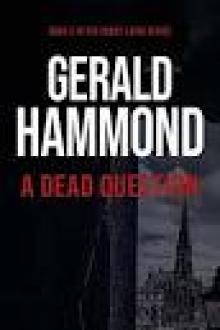 A Dead Question
A Dead Question Twice Bitten
Twice Bitten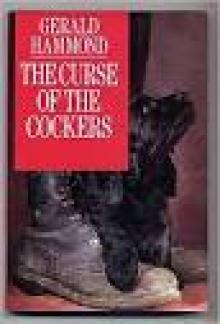 The Curse of the Cockers
The Curse of the Cockers In Loving Memory
In Loving Memory Illegal Tender (Three Oaks Book 12)
Illegal Tender (Three Oaks Book 12) Cold Relations (Honey Laird Book 1)
Cold Relations (Honey Laird Book 1)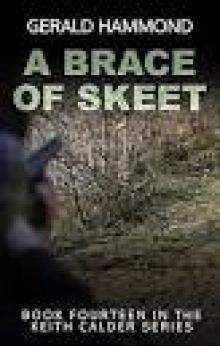 A Brace of Skeet
A Brace of Skeet Silver City Scandal
Silver City Scandal Sauce For the Pigeon
Sauce For the Pigeon Cold Relations
Cold Relations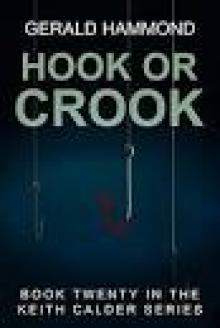 Hook or Crook
Hook or Crook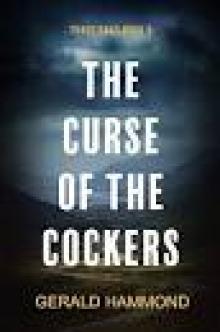 The Curse of the Cockers (Three Oaks Book 5)
The Curse of the Cockers (Three Oaks Book 5)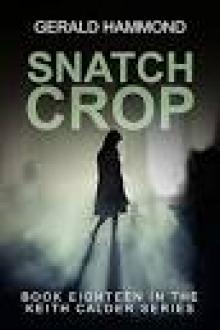 Snatch Crop
Snatch Crop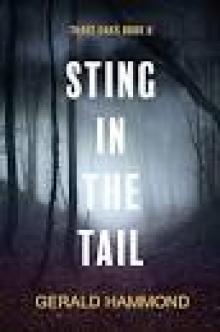 Sting in the Tail (Three Oaks Book 6)
Sting in the Tail (Three Oaks Book 6)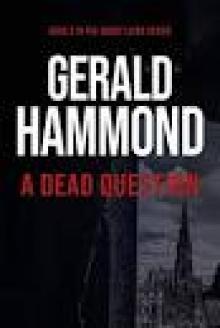 A Dead Question (Honey Laird Book 2)
A Dead Question (Honey Laird Book 2)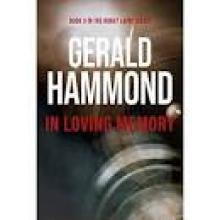 In Loving Memory (Honey Laird Book 3)
In Loving Memory (Honey Laird Book 3) Thin Air
Thin Air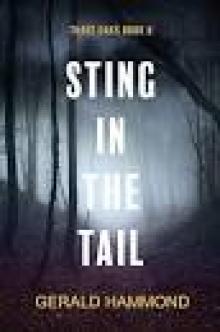 Sting in the Tail
Sting in the Tail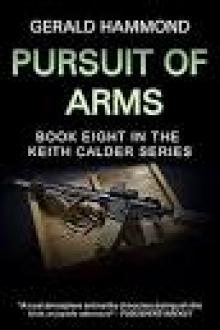 Pursuit of Arms
Pursuit of Arms The Game
The Game Give a Dog a Name (Three Oaks Book 4)
Give a Dog a Name (Three Oaks Book 4) Fair Game
Fair Game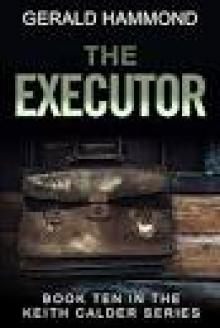 The Executor (Keith Calder Book 10)
The Executor (Keith Calder Book 10) Whose Dog Are You? (Three Oaks Book 2)
Whose Dog Are You? (Three Oaks Book 2) Mad Dogs and Scotsmen (Three Oaks Book 7)
Mad Dogs and Scotsmen (Three Oaks Book 7)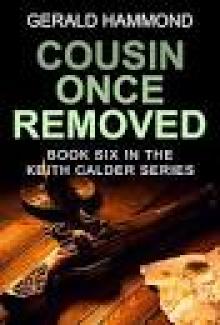 Cousin Once Removed
Cousin Once Removed The Worried Widow
The Worried Widow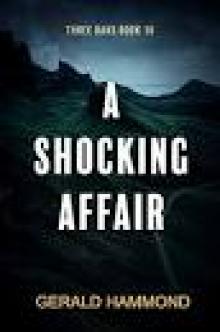 A Shocking Affair
A Shocking Affair Dead Weight (Three Oaks Book 11)
Dead Weight (Three Oaks Book 11) Whose Dog Are You
Whose Dog Are You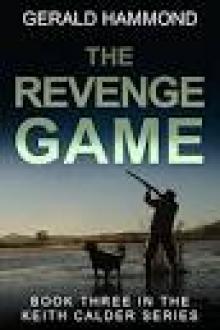 The Revenge Game
The Revenge Game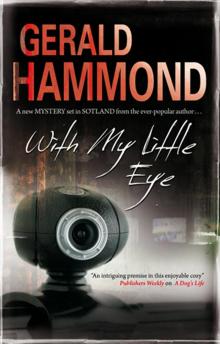 With My Little Eye
With My Little Eye Doghouse (Three Oaks Book 3)
Doghouse (Three Oaks Book 3)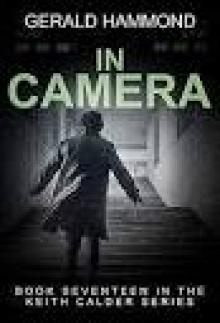 In Camera
In Camera Bloodlines (Three Oaks Book 8)
Bloodlines (Three Oaks Book 8)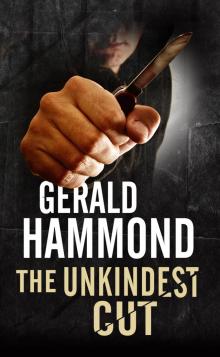 The Unkindest Cut
The Unkindest Cut